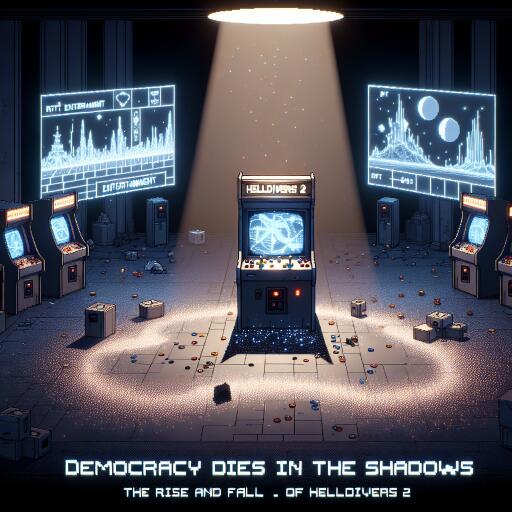Democracy Dies in the Shadows: The Rise and Fall of Helldivers 2
In the realm of independent game development, the journey from underdog to sensation is fraught with pitfalls and triumphs. Arrowhead Game Studios, a team based in Sweden, embarked on such a journey over a decade ago. They made their mark with the release of Magicka in 2011, a game that allowed players to blend elements to cast spells in a whimsical world rife with fantasy cliches. Its gameplay was lauded for both its innovation and the chaos of friendly fire, setting a tone for the studio’s creative direction.
Fast forward to 2015, Arrowhead Game Studios ventured into new territory with Helldivers. This title transported players to a fictional Super Earth where they, as Helldivers, ventured to various planets under the guise of liberating them and spreading democracy. The narrative was thick with satire, echoing the themes of Starship Troopers, yet amplifying the mockery to new heights. The game’s design favored cooperative play and was filled with accidental team kills, demanding precise teamwork and strategy amidst its lampooning of militaristic fervor.
The appetite for such thematic boldness was further indulged with the release of Helldivers 2 in February 2024. Arrowhead amplified everything from its predecessor, blending over-the-top propaganda with a caricatured celebration of war and conquest. The game’s release was meteoric, selling 12 million copies within weeks and pushing server capacities to their limits due to the overwhelming number of players eager to defend Super Earth.
The fervor for Helldivers 2 was palpable. Players worldwide united, drawing together to participate in a galactic war that spanned tens of planets. This collective endeavor fostered a vibrant community that was as eager to share tales of their exploits as they were to craft propaganda honoring Super Earth’s cause. Yet, as with any tale of rapid success, challenges were inevitable.
Initial issues at launch such as extensive login times and bugs marred the experience for some. However, a more significant controversy erupted in May when Arrowhead announced a requirement for players to link their PlayStation Network accounts to continue playing, alienating a global portion of their player base. This decision, initially justified by demands from Sony, the game’s publisher, sparked widespread backlash and accusations of anti-consumer behavior. After a tense period of back-and-forth, Sony retracted this requirement, albeit leaving a door open for future restrictions.
The summer following release saw a dip in player numbers as the enthusiasm of the launch period waned. Attempted balance patches, which often made the game more difficult, fueled frustration among the game’s community. This discontent led to significant changes within Arrowhead, including a reshuffling of leadership roles in an effort to more closely align the game’s development with player expectations.
In reflection, Helldivers 2 represents a moment of what could have been. Its premise and early execution tapped into a deep vein of potential, merging satirical commentary with engaging gameplay to create an experience that resonated globally. Yet, the pitfalls of unexpected success and the pressures of maintaining a rapidly growing online community led to challenges that dimmed its bright start.
Arrowhead Game Studios’ journey with Helldivers 2 is a testament to the volatile nature of game development and the unpredictable tides of player communities. Still, it stands as a beacon of what indie studios can achieve, offering lessons in ambition, creativity, and the delicate balance of listening to a global player base. For the sake of democracy—in-game and perhaps metaphorically—the hope is that lessons learned from Helldivers 2 will guide future endeavors towards enduring success.









